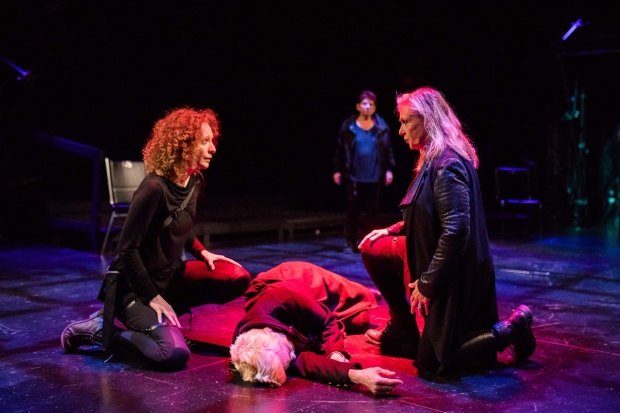Julius Caesar

(© Maggie Hall)
"It is no wonder," writes Bryn Boice in the director's notes for her all-female production of Julius Caesar, that the "play is pulled off the shelf each time a new leader comes to power." In its exploration of power and the danger of rhetoric, Julius Caesar would seem a hearty companion piece to our own current political horror show. Yet the power of Actors' Shakespeare Project's reimagining, now playing at Huntington Theatre Company's Studio 210, comes not from any radically provocative political statements but rather from the sheer fact that the cast is made up of entirely women.
From last winter's historic Women's March until now, as victims of sexual abuse come forward in record numbers, this production arrives at what feels like just the right time.
But aside from the empowerment and ferocity of this production and its cast, there is little to justify some of the woeful choices in Boice's production. There have been many all-female productions of Julius Caesar before, so this production isn't a trailblazer. But one thing that sets it apart from some of the others is the fact that the genders, and in turn their respective pronouns, have all been changed to reflect that all the characters in the play are female.
The setting and time period have also been reimagined. Here, Rome is not a city in Italy but a science-fictional alternate future universe. With visions of making Rome great again, Cassius hatches a plot to murder Caesar, concerned that she is abusing her power. Cassius has already amassed a small group of conspirators and must convince Brutus to come on board with their plan. When word gets out that Caesar may be getting closer to accepting Antony's offer of the crown, Brutus decides that Caesar must die for the good of Rome. A civil war ensues as Antony promises revenge, turning the countrywomen against Caesar's murderers.
Bold as it may be, there is nothing that justifies this concept and it winds up being a head-scratching distraction more than anything else. A particular problem that arises with setting this production in the future is that costume designer Rebecca Jewett has all of the costume pieces looking very 2017, with the cast cloaked almost entirely in black (except Caesar, who at one point wears a terrific gold cloak). The ever wonderful Cristina Todesco has designed the sets, which consist of nothing more than sparse scaffolding that surrounds the oval playing space. Jen Rock's lighting, too, helps transport us to this alternate universe.
Beyond the problematic creative concepts of this production, it does provide a showcase for a terrific cast. Bobbie Steinbach is a formidable Cassius and MaConnia Chesser is a standout as Casca. Marya Lowry, who has a great command of Shakespearian dialogue, is an adequate Brutus, yet she doesn't quite tap into the character's inner tumult. Without inner conflict, Brutus fails to become the play's tragic hero. The evening belongs, though, to Marianna Bassham as Marc Anthony, who gives one of the best performances of the year. At once ferociously vengeful and vulnerably heartbroken, this is a new height for one of Boston's best actors.
Boice's production also suffers from a lack of cohesion and pacing issues. With the first act alone clocking in at two hours, this Caesar ultimately tests the audience's patience more than it ought to.
Yet for all the production's problems, there is irrefutable power to imagining a world in which women are in charge. Bassham's unmissable performance, combined with the enormity of the play's final moments as the cast chants "This was woman," make this a trip to Rome worth taking.










